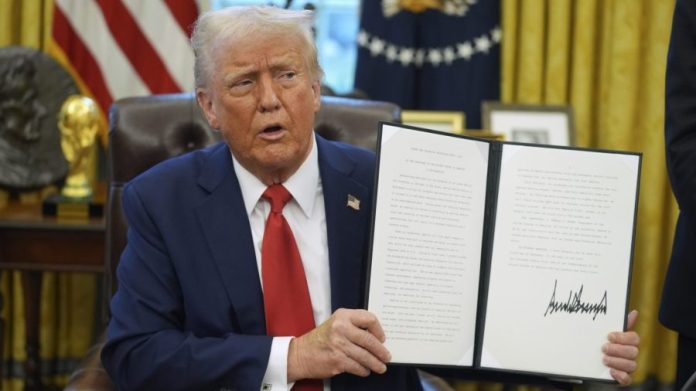
President Trump’s effort to punish law firms suffered yet another judicial defeat on June 27, when U.S. District Judge Loren AliKhan enjoined enforcement of his executive order targeting Susman Godfrey. But one seemingly obscure aspect of the case deserves more attention, as it suggests a broader threat to America’s system of free expression.
The Susman executive order was the odd one out from the start. The orders against Perkins Coie, Paul Weiss, Jenner and WilmerHale all recited personal grudges that Trump held against people associated with the firms. There were ideological objections in each order as well, to be sure, but the orders were personal to the president in a way the Susman order was not.
Perhaps for this reason, the grievances recited in the Susman order were not specific. The order referred to election work without citing anything, but each side concluded that the White House probably had in mind Susman’s representation of state officials in 2020 election challenges and perhaps the $787.5 million defamation settlement the firm won for Dominion Voting Systems in a case against Fox News.
But then the order said this: “Susman also funds groups that engage in dangerous efforts to undermine the effectiveness of the United States military through the injection of political and radical ideology.”
What was that about? No one seemed to know.
At the temporary restraining order hearing, Donald Verrilli Jr., the former U.S. Solicitor General who represented Susman, said the firm was “completely mystified by that.” Oddly, the government was equally puzzled: “Regrettably, your honor, I have no further information than what’s contained in the order.”
With the temporary restraining order issued, Susman moved for summary judgment, and, in the government’s opposition filing, the mystery of the seditious funding accusation was solved.
In 2017, during the first Trump administration, the president issued an executive memorandum banning transgender people from military service. Multiple lawsuits followed. One, Stockman v. Trump, was filed by Latham & Watkins. Susman did not file the case and never appeared in it.
Eventually, lawyers affiliated with the gay rights group GLAD, a respected and effective advocacy organization founded in 1978, did enter an appearance. But those lawyers did not work for Susman, either.
In opposition to Susman’s summary judgment motion, the government submitted the Stockman complaint and a “GLAD Brief,” a magazine-style publication discussing GLAD’s advocacy work. Like many such publications, it thanked GLAD’s supporters and listed them. Some lawyers (such as Walter Dellinger) and firms (including Gibson Dunn, Paul Weiss and WilmerHale) were listed as providing legal support. Yet Susman was not on this list.
Another list thanked financial supporters, including Matt Damon, the Elton John AIDS Foundation and Wells Fargo. And here, at last, we find Susman. In the Winter 2018 GLAD Brief, in the final of six columns on page 11, the firm is listed as giving between $3,000 and $4,999 to GLAD.
Mystery solved.
The problem, of course, is that making a charitable contribution to an advocacy organization such as GLAD is constitutionally protected under First Amendment rights of speech and association. That rule has been clear since NAACP v. Alabama (1958) and has been strengthened over time.
Thus, in defending an order that unlawfully retaliated against Susman for views expressed in a representative capacity, the government expanded the scope of its retaliation to include charitable contributions as well — adding an additional violation to the sizeable list evident on the face of the order. The government defended the position that the president may issue punitive executive orders based on charitable contributions to advocacy organizations he dislikes, a stance that extends far beyond law firms.
Today GLAD is a target; tomorrow it may be the right-leaning Pacific Legal Foundation.
I have sympathy for the government lawyers tasked with defending these orders. I doubt they had this in mind when they applied for the jobs. It must have been embarrassing to face a district court not knowing basic information about the Susman order, and it was conscientious lawyering to track down the answer.
As a tactical matter, however, the answer was worse than the inability to provide an answer. One of the more important rules of lawyering is the “first rule of holes”: When you find yourself in a hole, stop digging.
But the substantive point is more worrying. The claim that a president can threaten a business because he dislikes its charitable giving should not be taken seriously. From the perspective of free speech jurisprudence since the 1950s, and the system of freedom of expression it supports, the claim is madness.
That the government was willing to make such an absurd claim reinforces a point each district court that has dealt with one of these orders understood, and which the D.C. Circuit should grasp as the Perkins case heads its way. This needs to stop here, and it needs to stop now.
David McGowan is the Lyle L. Jones Professor of Competition and Innovation Law at the University of San Diego School of Law.

